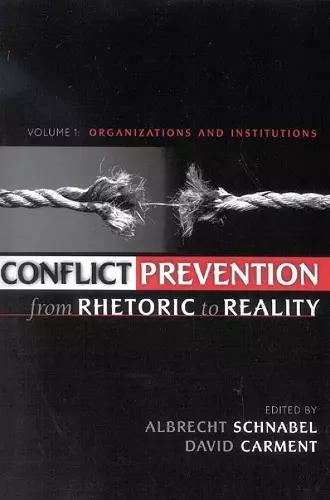Conflict Prevention from Rhetoric to Reality
Organizations and Institutions
David Carment editor Albrecht Schnabel editor
Format:Paperback
Publisher:Lexington Books
Published:2nd Jul '04
Currently unavailable, and unfortunately no date known when it will be back

In response to the shaky record of the international community's peacekeeping and conflict management efforts, academics and policymakers have begun to re-examine conflict prevention as a key instrument for the advancement of peace in a war-torn world. In Conflict Prevention from Rhetoric to Reality, Volume 1: Organizations and Institutions conflict prevention specialists from Asia, Africa, Europe, and the Americas, with professional experience in regional organizations, the UN, and various NGOs and research organizations, argue that, as a concept as well as a policy, conflict prevention is moving beyond rhetorical commitments and symbolic, ad hoc, activities. Institutional, long-term efforts specifically targeted at the prevention of violent conflict have become more than just wishful thinking. Together with local actors, many governments, regional organizations and the UN are embracing preventive action as a viable path towards sustainable peace. The contributions to this volume trace conflict prevention efforts in various regional contexts and explain how preventive thinking is being successfully mainstreamed into the activities of regional organizations and the UN. They show that, while conflicts may not always be prevented, even in cases where reliable monitoring triggers effective early warning and preventive action, the likelihood of an outbreak of violent conflict can be greatly reduced by determined, systematic efforts to address the root causes of potential violence.
These two volumes form an encyclopedic study of the means of conflict prevention. The first volume examines agents and institutions, the second causes and capacities. The choice of chapters to encompass the components of the subject is careful and comprehensive, and there is much bredth and wisdom in the chapters themselves. The volumes deserve a wide and bifocal audience. For analysts, the two volumes push back the frontiers into new aspects to study; for practitioners, they show that the challenge is in applying what we know aplenty, not in hiding behind claims of ignorance... -- I. William Zartman, The Paul H. Nitze School of Advanced International Studies, Johns Hopkins University
It is always a pleasure to come across volumes with the breadth and scope as the ones edited so perceptively by David Carment and Albrecht Schnabel. Their gumption illuminates the patterns of mainstreaming conflict prevention in the post-Cold War period. In this respect, these tomes are not simply a reassessment of extant analytical frameworks, but an inspiring mapping of politics and policy of conflict prevention. Thence, the two parts of Conflict Prevention are a lasting testimony of the encyclopedic endeavor to chart the gist of different conflict prevention approaches, while presenting a cornucopia of insight and best-practice. * Panorama *
The scholarship is first-rate, thorough, and comprehensive. This work will be a significant contribution to the study, training and practice of conflict prevention. . . . Overall the original evidence, comprehensiveness, and integrative nature of the work are its best features. -- Franke Wilmer, Director and Professor, Political Science, Montana State University, Bozeman, , Director and Professor, Political Science, Montana State University, Bozeman
These two volumes form an encyclopedic study of the means of conflict prevention. The first volume examines agents and institutions, the second causes and capacities. The choice of chapters to encompass the components of the subject is careful and comprehensive, and there is much bredth and wisdom in the chapters themselves. The volumes deserve a wide and bifocal audience. For analysts, the two volumes push back the frontiers into new aspects to study; for practitioners, they show that the challenge is in applying what we know aplenty, not in hiding behind claims of ignorance. -- I. William Zartman, The Paul H. Nitze School of Advanced International Studies, Johns Hopkins University
ISBN: 9780739107386
Dimensions: 225mm x 232mm x 34mm
Weight: 662g
400 pages